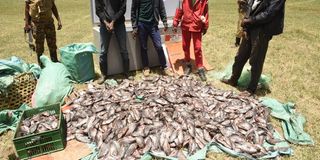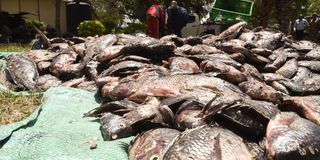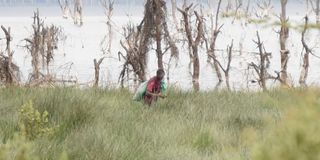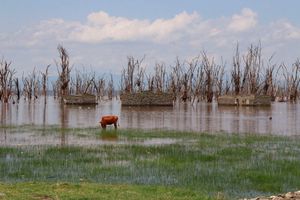
Suspected illegal fishermen in handcuffs with their harvest of fish after being arrested at Lake Nakuru National Park.
Under the cover of darkness, fishermen sneak into Lake Nakuru driven by poverty and the high cost of living.
They cast their nets despite the ever-present danger of ferocious hippos, deadly crocodiles and armed Kenya Wildlife Service (KWS) rangers determined to keep them out of the protected waters.
It is an illicit trade, but the profits are hard to ignore.

Suspected illegal fishermen with their harvest of fish after being arrested at Lake Nakuru National Park.
On a good night, a fisherman reveal they can make between Sh800 and Sh1,000 enough to feed a family. However, it comes at a deadly price.
Many have drowned while fleeing KWS officers while others have been mauled by wild animals and some have allegedly lost their lives at the hands of law enforcement.
Unfit for human consumption
The government declared Lake Nakuru’s fish unfit for human consumption due to high levels of arsenic, a toxic metal that can cause cancer, respiratory issues and other health complications. But despite this, fishing in the lake has boomed particularly among residents of Mwariki, Barut and Lake View estates.
In January 2024, then Mining and Blue Economy Cabinet Secretary Salim Mvurya revealed that fish in the lake contained up to 32 percent arsenic, a dangerously high level.
“Fish from Lake Nakuru is not fit for human consumption. It poses serious health risks, including cancer, respiratory problems, and organ damage,” Mr Mvurya said then.
But the poisonous catch continues to sell.
Kenya Marine and Fisheries Research Institute (Kemfri) first banned the fish in 2021, citing toxic chemical elements. However, enforcement has been weak and many traders still sell the fish to unsuspecting buyers especially in informal markets.
'We will still fish'
Vitalis Odhiambo, a resident of Mwariki, is among those who risk their lives every night to fish.
“On a good day, we make decent money but the dangers are real. We have lost many friends,” he says in an interview with Nation.Africa.
KWS rangers are tasked with enforcing the ban but the fishermen have found ways to evade them.
Despite the frequent crackdowns, fishermen they work in shifts, using scouts to alert them of approaching rangers. Some hide in the reeds while others flee into the water, hoping to escape notice.
But not all escape.
Paying with their lives

A portrait of Nakuru fisherman Brian Odhiambo who disappeared on January 18, 2025 after being arrested by KWS officers at Lake Nakuru National Park.
On Wednesday, the body of a fisherman was retrieved from the lake a month after another fisherman, Brian Odhiambo, mysteriously disappeared while allegedly in KWS custody.
The body found floating with fishing gear bore visible injuries, raising more questions than answers.
According to Nakuru West Sub-County Police Commander Anderson Njagi, KWS rangers on patrol discovered the unidentified body and later moved it to Nakuru City Mortuary for identification and a postmortem examination.
Brian’s mother, Auma Elizabeth Auma, said her family is disappointed that her son is yet to be found, dead or alive.
“When we heard that a body had been retrieved, we were so happy. We rushed to the lake and camped there for hours, waiting for confirmation. I truly believed it would be my son,” said Ms Auma.
Nakuru-based human rights activist David Kuria who was at the mortuary to receive the body noted it had visible injuries and was still dressed in fishing gear.
“I had been informed that two bodies were retrieved, but only one has been brought here. We do not know where the other one is. Once the family comes forward, a postmortem will be conducted to determine the cause of death,” Mr Kuria said.
The case of Odhiambo is not an isolated incident.
Over the years, many fishermen have either gone missing or turned up dead.
In May 2024, four people, including a Form Two student, were shot by KWS officers in Barut during a crackdown on illegal fishing.
In 2021, Derick Otieno Odhiambo, 23 died under unclear circumstances while in KWS custody.
His family claims he was beaten to death, a claim backed by a government pathologist Dr Titus Ngulungu’s report, which confirmed he suffered excessive bleeding due to head and body injuries.
Although the matter was reported at the Barut Police Station under OB12/15/6/2021, no action has ever been taken.
In another tragic case in September 2021, 15-year-old John Chege was killed by a hippo while fishing. His friends watched in horror as he slipped into the water while trying to escape KWS officers. The hippo caught up with him before he could make it to safety.
The disappearances and deaths have led to growing mistrust between the fishermen and KWS rangers.
Others who have been shot and injured while on fishing expeditions at the lake include; Barack Obama Odhiambo,17, Alvin Williams,20, Sammy Njenga Kamau, 22, and Obedi Luka Keya,19.
Last year alone, more than ten people suffered injuries in the hands of KWS officers.
“They treat us like criminals, yet we are just trying to survive. They beat me so badly that I thought I was going to die. I was just walking near the lake when they accused me of being a fisherman,” says Samson Ng’ang’a who survived a brutal encounter with rangers.
Moses Olwenyi shares a similar ordeal.
“I left my house at 1 am to go fishing. KWS officers spotted me using binoculars and ambushed me as I came out of the water. They beat me for 30 minutes and left me naked, thinking I was dead. I crawled out of the park,” he said.
Amid the public outcry, the KWS has remained tight lipped over the incidents, only responding to Brian Odhiambo's disappearance.
"The KWS acknowledges the community's concerns regarding recent incidents inside the Lake Nakuru National Park. We appeal for calm and support the ongoing law enforcement efforts. We are working closely with other agencies to address the emerging issues," KWS said in a statement, as they promised that they were cooperating with security agencies in investigations into the latest incident of the disappearance of Brian Odhiambo.
For the Lake Nakuru fish, some species like Magadi tilapia were initially introduced to control mosquitoes but now they sustain an underground fish market.
According to a medic, Dr David Kariuki, arsenic is a naturally occurring element that can be found in soil, water and air.
"While it has some industrial uses ,exposure to high levels of arsenic can be harmful to human health- including disruption of the normal functioning of cells and tissues, increased risk of mutations and the development of cancers and respiratory issues such as chronic bronchitis and lung cancer,” revealed Dr Kariuki.
Lake Nakuru was once famous for its flamingos but the rising water levels in 2020 changed everything. The lake expanded swallowing homes, roads, and farmland.
With the new water levels came an increase in fish populations creating an opportunity that many desperate residents could not ignore.
And what started as a few people casting lines soon grew into a full-fledged industry. Makeshift fish stalls popped up around the lake, selling fresh and cooked fish to both locals and visitors.

A man suspected to be an illegal fisherman with his catch at Lake Nakuru National Park.
The government’s efforts to stop the trade have done little to deter those who see it as their only means of survival.
Many of those involved in illegal fishing were displaced by the lake’s rising waters, leaving them with no homes and no alternative livelihoods.
“We have no choice because people are hungry. If you tell them the fish is poisoned, they don’t care. They just want to eat,” says a fishmonger who operates near the lake.
Authorities in Nakuru have been conducting public sensitization campaigns to discourage illegal fishing, warning residents of the dangers posed by both wildlife and toxic fish.
However, the economic hardships have made compliance difficult. Despite repeated crackdowns, arrests, and public warnings, the illegal fishing trade in Lake Nakuru continues to thrive.
For now, the fishermen will keep venturing into the dark waters, risking their lives for a meal. Some will return home with fish, others will never not return.







